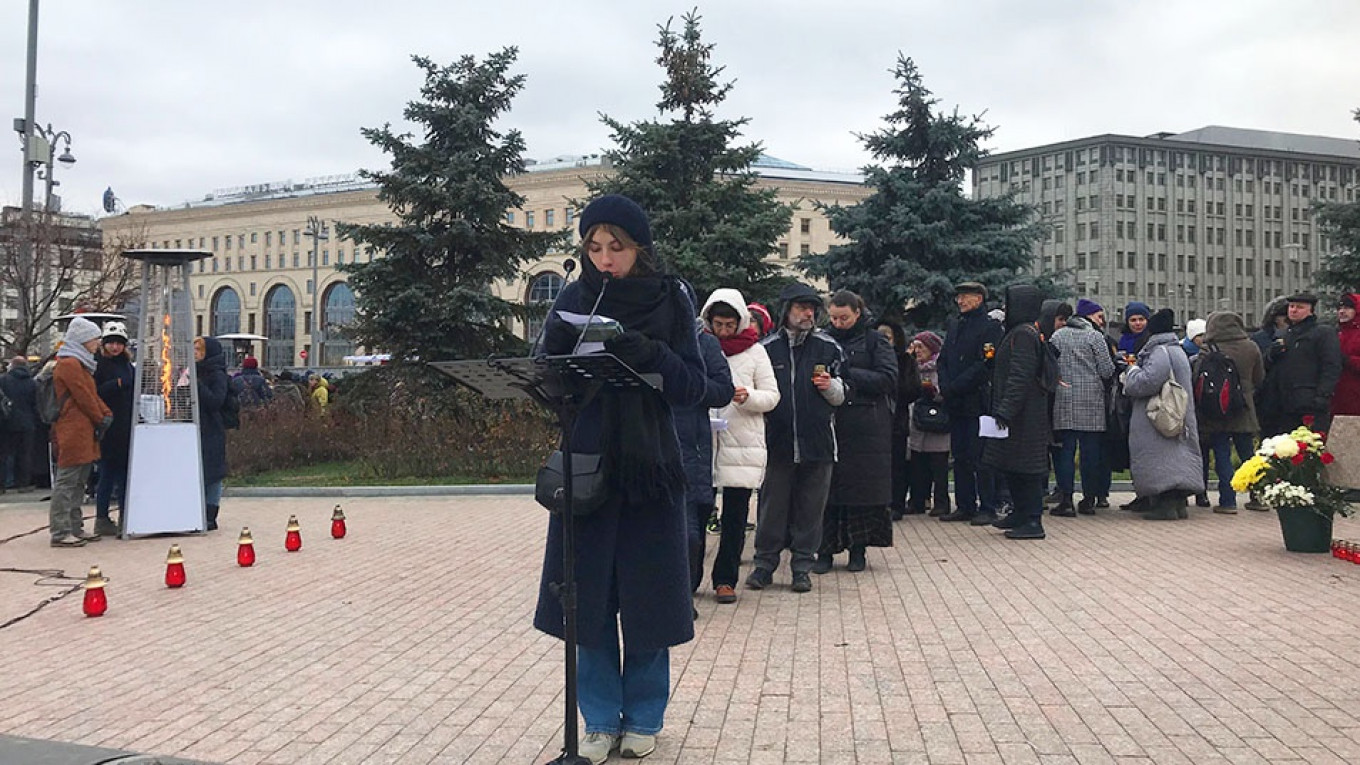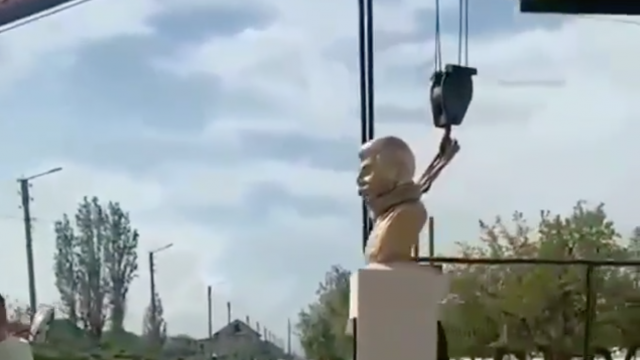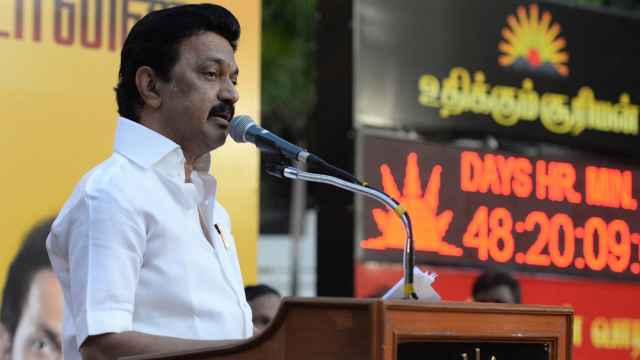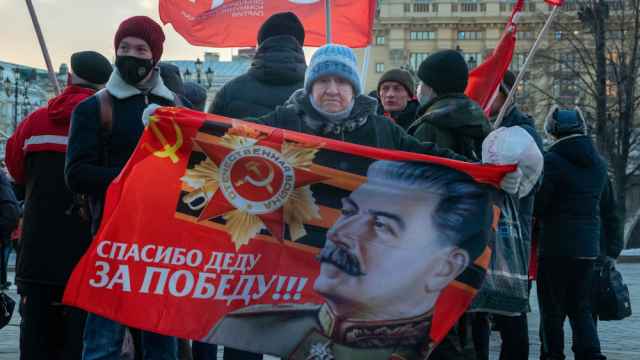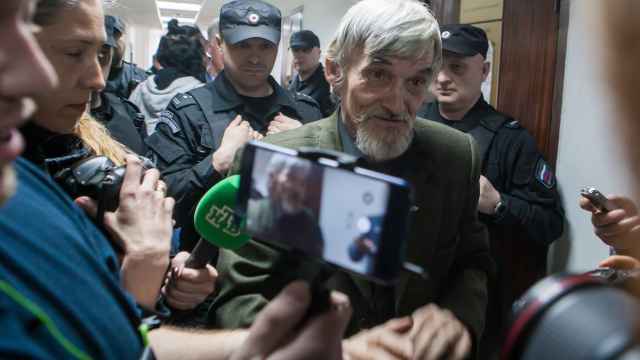One by one they stepped up to recite the names: “Nikolai Afanasiev.” “Filipp Bezikov.” “Boris Troitsky.” “Vladislav Yankovskiy.” And hundreds more.
Those who came to Lubyanka Square in the shadow of the former KGB headquarters on Monday took turns reading not just the names but professions and ages of those killed during Josef Stalin’s Great Terror. In a line that wrapped around the square, they waited their turn for up to three hours in temperatures that hovered around freezing throughout the day and into the evening.
“It’s important that he knows what happened,” said Sulamif Volfson, 40, who brought her 10-year-old son Yakov with her for the second year running. “We have relatives who were killed during the repressions, and we have relatives who helped carry them out. I want him to know the full history.”
The Memorial human rights group, which has organized the “Returning the Names” event on the same date for the past 12 years, has identified more than 40,000 Muscovites as victims of Stalin’s purges. As many as 30 million are believed to have been killed during Soviet repressions.
In addition to Moscow, events were set to take place in 35 other Russian cities. On Monday, commemorations were also scheduled in London, Prague, Warsaw and Washington D.C.
The event in Moscow takes place each year adjacent to the Solovetsky Stone at Lubyanka Square, a memorial to Stalin’s gulag labor camps. This year, however, the location almost wasn’t approved by city officials.
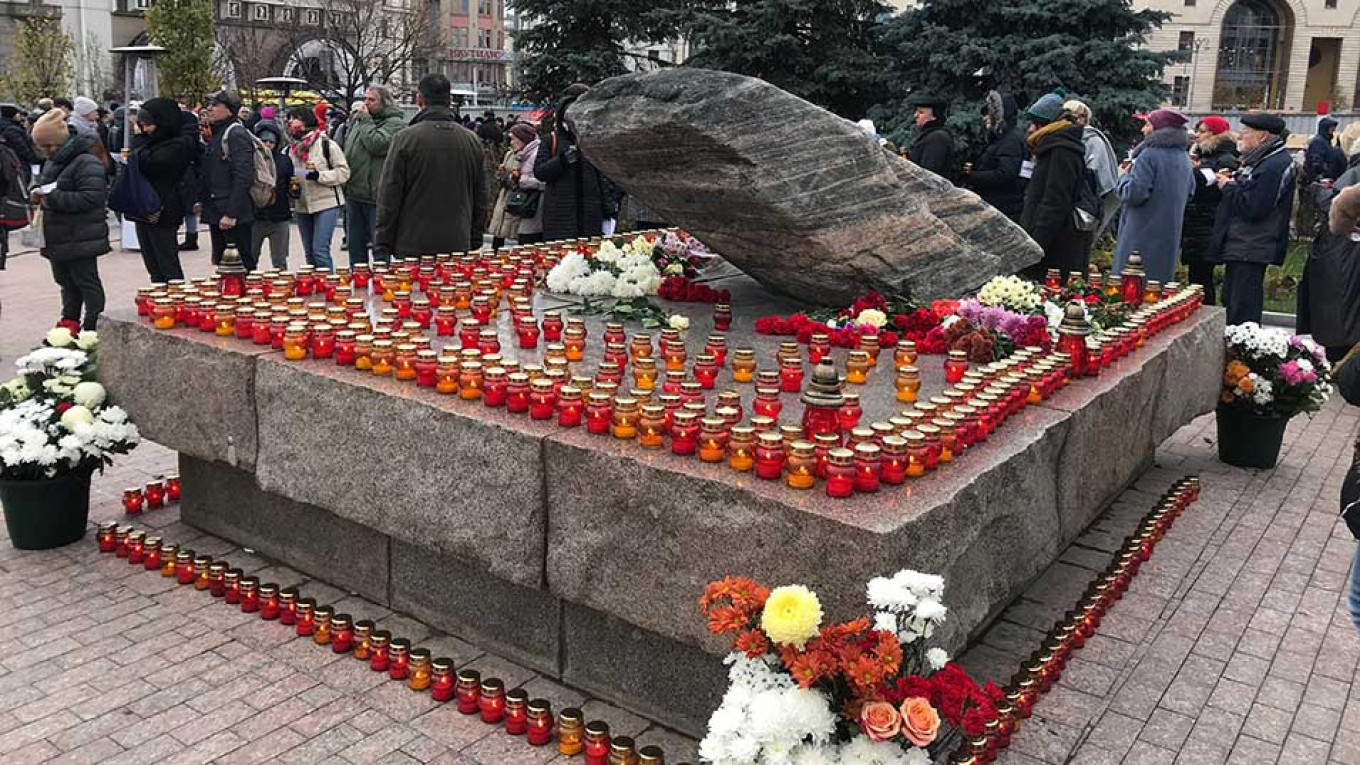
On Oct. 19, City Hall withdrew permission for the location, citing nearby construction. Officials said it could be moved to the recently opened “Wall of Grief” memorial, which President Vladimir Putin ordered constructed in 2015.
But following a public outcry, the authorities approved the traditional location last week.
“I would have come here anyway,” said Tatiana Konakova, 59, whose father survived Stalin’s gulags. “At the new memorial, there is engraved text asking us to forgive the repressions. We must always remember what happened, not forgive.”
Alexander Cherkasov, Memorial’s chairman, said he wouldn’t speculate as to why the authorities wanted to move the event. He said it didn’t ultimately happen because the ceremony is important “for all Russians, whether they are activists or not.”
Monday’s event came as Memorial faces broader political instability. Two of its researchers — Yury Dmitriyev, a Gulag historian, and Oyub Titiyev, its head in the republic of Chechnya — are currently detained on charges widely believed to be politically motivated. The NGO was declared a “foreign agent” two years ago for receiving funding from abroad.
“Yes, human rights activists are having a more difficult time,” said Cherkasov. “But the way we fight back is by continuing to remember.”
At the event on Monday, Grigory Yavlinsky, an opposition politician of the Yabloko Party, said that the attempt to change locations was a part of the government’s continued “rehabilitation of Stalin’s image.” Indeed, Putin has accused the West of “excessive demonization” of the Soviet leader, and Russians last year voted him the “most outstanding” person in history.
On Monday, however, hundreds of Muscovites alongside foreign ambassadors displayed resistance to this push.
“I lost my father and two uncles,” said Inga Shestakova, 85, who comes to the square every year with her husband. “It’s too difficult emotionally to last more than an hour here, but I believe we must keep doing it.”
One participant, who was 70 years younger, echoed the sentiment.
“In hard times people become nostalgic for leaders they see as strong,” said Fyodor Volkov, 15. “We must remember what really happened.”
A Message from The Moscow Times:
Dear readers,
We are facing unprecedented challenges. Russia's Prosecutor General's Office has designated The Moscow Times as an "undesirable" organization, criminalizing our work and putting our staff at risk of prosecution. This follows our earlier unjust labeling as a "foreign agent."
These actions are direct attempts to silence independent journalism in Russia. The authorities claim our work "discredits the decisions of the Russian leadership." We see things differently: we strive to provide accurate, unbiased reporting on Russia.
We, the journalists of The Moscow Times, refuse to be silenced. But to continue our work, we need your help.
Your support, no matter how small, makes a world of difference. If you can, please support us monthly starting from just $2. It's quick to set up, and every contribution makes a significant impact.
By supporting The Moscow Times, you're defending open, independent journalism in the face of repression. Thank you for standing with us.
Remind me later.



